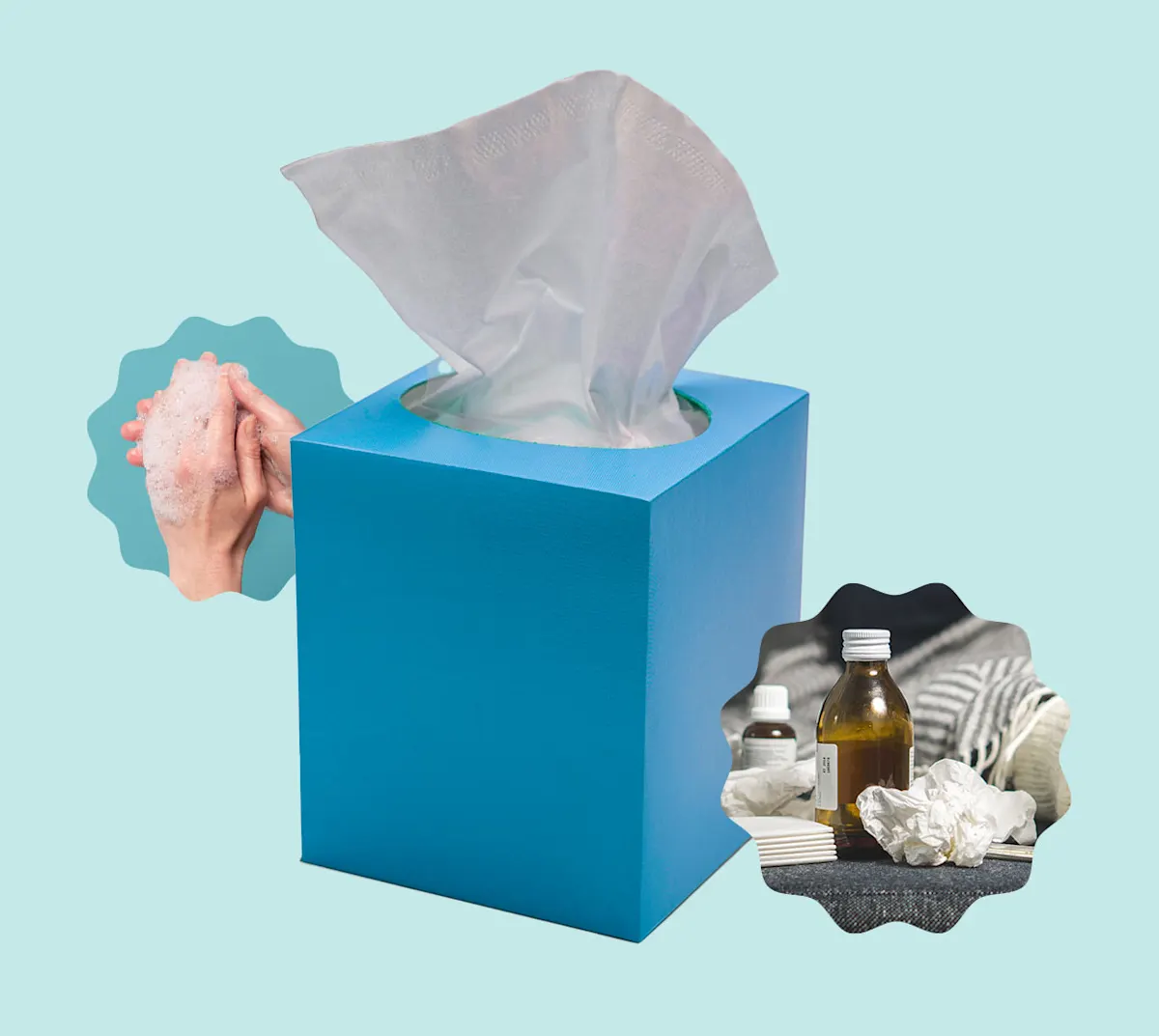*This article includes mentions of merchants or brands who are partners of DoorDash, and DoorDash may receive a commission if you choose to make a purchase from these merchants or brands.
The information supplied in this article is based on the pediatricians’ own opinions and should not be used as a substitute for medical advice. Those who need a licensed healthcare provider should contact a qualified professional directly.
We’ve all been there: dripping nose, low-grade fever, achy body, weariness. When you’re sick, all you want to do is get better. And while you’ve maybe heard some of this advice before, it bears repeating, especially because when you’re sick, it’s legit hard to think straight.
Dr. Julia Blank, a family medicine physician at Providence Saint John’s Health Center in Santa Monica, California, and Dr. Flora Sinha, an internist at Cedars-Sinai Hospital in Los Angeles, divulge eight tips they share with their patients to get them back to feeling 100% — and why each works wonders to speed up your recovery.
Consider this your checklist. (And if you need chicken soup or over-the-counter medication stat? DoorDash has you covered.)
Shop Health1. Drink lots of fluids

Your mom was right: It’s important to stay hydrated when you’re under the weather and, whether you’re sipping chicken soup (it works — see below!) or drinking Gatorade, it helps to keep pounding fluids.
Why you should follow this advice: When you have a fever, you feel depleted for several reasons, including the fact that you’re losing body water. Staying hydrated is also important as fluids help thin out mucus and makes it easier to clear nasal congestion or cough up all the stuff that’s clogging your airways, says Julia Blank, MD, a family medicine physician at Providence Saint John’s Health Center in Santa Monica, California. Opt for water, juice, tea or broth. Skip the caffeine and alcohol since both can be dehydrating.
And Grandma knew what she was talking about when she called chicken soup “nature’s Penicillin.” Dr. Blank elaborates: “Chicken soup helps thanks to an amino acid (cysteine) in it that may help thin mucus and ease congestion.”
Tip: Moisturize the air in your home with a cool-mist humidifier, which can help loosen congestion. Also, nasal saline spray can help loosen secretions and temporarily relieve nasal congestion.
2. Get plenty of rest
The more you burn the midnight oil, the harder it is for you to get better.
Why you should follow this advice: Sleep helps your immune system fight off cold viruses, says Flora Sinha, MD, an internist at Cedars-Sinai Hospital in Los Angeles. “When you’re sick, sleep and rest plays a vital role in restoring your immune system,” she says. “Sleep also helps with tissue repair, lowering inflammation and fever and preventing further complications.”
Tip: Stay consistent with your sleep cycle. “If you function well on five hours, keep to that sleep amount as consistently as possible,” she says. “If you need the full eight hours, try to get eight hours of sleep.” So, it’s totally fine if you aren’t napping around the clock. But be sure you’re not getting less sleep than usual.
3. Skip the gym
For gym rats, it’s hard to take a break from the daily exercise high. If you’re a daily runner or cyclist, we know it’s a bummer to skip the workout. But when you’re sick, it’s best to take a break.
Why you should follow this advice: Powering through and putting your body through a high-intensity workout can end up prolonging the duration of your sickness, Dr. Sinha says.
Tip: However, if you’re not running a high fever or coughing, it’s okay to move your body a little — light stretching, restorative yoga, or a short walk work well. “I always tell my patients to use common sense,” Dr. Sinha says. “When we’re sick, our bodies are telling us we need to chill out and relax a bit. Trust me, it’s okay to veg until you’re feeling better.”
4. Keep your hands clean

We learned this during COVID-19 — if you can’t wash your hands, use hand sanitizer. Turns out, this act is one of the simplest ways to keep your respiratory droplets to yourself.
Why you should follow this advice: Clinically, when someone has a true fever (above 100.4), they’re contagious, Dr. Sinha says. “To decrease transmission, and this goes with any viral or bacterial illness, it’s important to wash your hands and potentially mask because a lot of upper respiratory infections are transmitted through coughing and sneezing.”
Tip: Wash your hands thoroughly throughout the duration of your illness and continue Clorox-cleaning your surfaces. “This can help prevent exposing others to your cold or flu,” she says.
5. Gargle with warm salt water
It may sound old-fashioned, but gargling with salt water is an easy (and inexpensive) way to help ease your cough and aching throat. Just mix one-fourth to one-half teaspoon of salt with eight ounces of warm water, and gargle but don’t swallow it. You’ll help kill bacteria in the process.
Why you should follow this advice: When you’re hit with an upper respiratory virus, the first area you’ll feel it is in your nose and throat. “Our immune systems will then start fighting this foreign thing in your body and increase blood flow to those areas,” Dr. Sinha says. “The body will increase mucus production, and gargling can reduce inflammation, help draw out excess water from cells, and reduce swelling and irritation.”
Tip: Menthol lozenges can help temporarily clear nasal passages and soothe a sore throat. Mucus-thinning medications that contain guaifenesin can temporarily ease nasal and chest congestion and make it easier to clear secretions, Dr. Blank says.
6. Take a hot shower

This age-old remedy works to not only soothe aches, but the steam may help you “sweat out” some of your symptoms.
Why you should follow this advice: Increasing moisture will help flush out toxins and help open your airways, Dr. Sinha says. “This is also helpful for nasal congestion and sinus pain,” she says.
Tip: Consider using Vicks vaporizer to help drain your sinuses, Dr. Sinha says.
7. Stop smoking
When you smoke, you’re inhaling substances such as tobacco or marijuana, both of which can further irritate your nose, throat and lungs — especially if you already have symptoms like sneezing, congestion, a sore throat, or breathing issues.
Why you should follow this advice: Smoking promotes a state of inflammation throughout the body. “Smoking is an inhalant so when you’re ill and your upper respiratory tract is already inflamed, this just adds more pressure on your body,” Dr. Sinha says.
Tip: Avoid vaping, too, as this method of inhaling nicotine (or marijuana) also increases inflammation and will prolong your illness, Dr. Sinha says.
8. Listen to your stomach
When you feel terrible, you likely don’t want to eat much. All the more reason it’s important to make good choices when you are up for eating something. Choosing something healthy and nourishing when you have the appetite will help you get on the mend that much faster.
Why you should follow this advice: If you’re having GI issues (some upper respiratory infections, like the flu and COVID-19, can cause diarrhea and irritate your stomach), stick with the BRAT diet (bananas, rice, applesauce, and toast). “This helps give your gut some rest,” Dr. Sinha says. “It’s gentle on the stomach; it’s low in fiber; it’s easy to digest and reduces nausea and vomiting.”
Tip: Take it easy once you’re feeling better — and gradually return to your regular diet. “When you’re feeling lousy, a burger, fries, and milkshake won’t help the healing of your cells,” Dr. Sinha says. In other words, take the time to get better.
Is someone you know not feeling well? Send them a care package!
Shop Health




